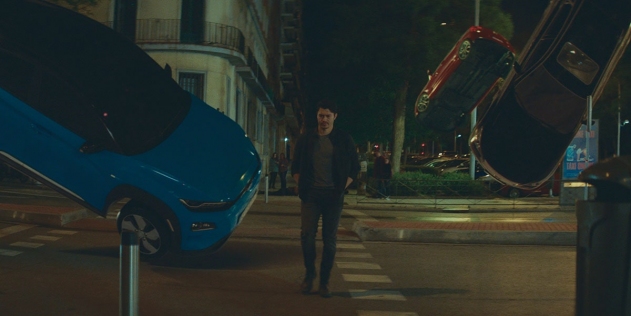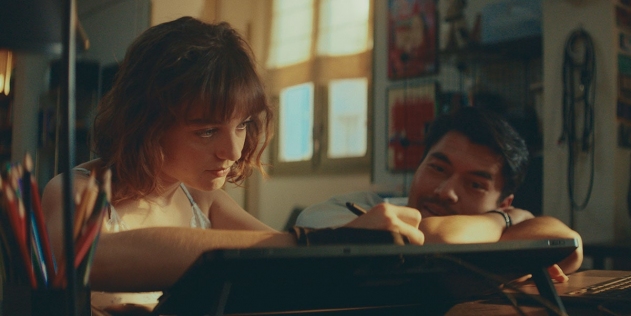
Starring Henry Golding (CRAZY RICH ASIANS) and Beatrice Grannò (THE WHITE LOTUS), Nacho Vigalondo’s latest feature DANIELA FOREVER follows a man mourning the death of his girlfriend, who uses a clinical trial for a new lucid dreaming drug to conjure her back into his life. The film made its world premiere in the Platform section of the Toronto International Film Festival and was selected for the Sloan Science on Screen Film Showcase. We sat down with Vigalondo at TIFF to discuss dreams, the film’s technical approach, and working with the cast. Meanwhile, Stephen King, also in attendance at TIFF, walked by.
Science & Film: How did you arrive at lucid dreaming as a central plot point for this story?
Nacho Vigalondo: I remember many, many years ago, I was thinking, what if you have a dream in a movie and the conclusion of the movie happens within that dream? What if you start a movie with a character and in the midpoint, that character has a dream, and we stay for the rest of the movie within the dream? What if you have a flashback and the movie ends within the flashback? What if we break the narrative for real? I have a ton of ideas like that. They are these kind of abstract jokes, not like real premises, but they are just sitting there in case anything works for me at any time.
It wasn't until I wanted to talk about grief and depression and addiction—those three things combined, coming, of course, from personal experiences—it wasn't until that time that I came up with the idea: what if we can escape from all those states of mind through dreams, through dreams that actually kind of happen narratively because the character is building them. But what if there are consequences? So, as you can see, lucid dreams, they are not the starting point, but they become a beautiful way to describe everything I need. Lucid dreams are a tool to make the movie more specific and less abstract.
I think the fact that lucid dreams are real, and the fact that some people are able to achieve that is, for me, it's mind blowing. Because it's like living within science fiction. I guess we are already living in a science fiction reality, because we have the AI thing, which we kind of get used really quick, which is something that fascinates me. Like, if the aliens suddenly come by and say hi, we will get used to that in hours. And to me, the fact that some people can have the discipline to achieve lucid dreams, which means an alternate reality by design, is for me, mind-blowing.
S&F: Have you ever tried?
NV: There's no way I can try. Let's put it this way: if ADHD was a can of beans, my face would be on the sticker. I was recently diagnosed, and all the questions were answered. My brain only accepts discipline under really, really specific circumstances. Once I heard that you need to do some mental exercises in order to make lucid dreams, I knew instantly that it was impossible for me. I don't even have normal dreams. I don't even remember them. Just a bunch of them all my life [I have remembered].
It's kind of sad. It's night, I go to bed, and my brain has unlimited budget for me to enjoy. This is not a joke. This is real. I never had what you human beings call a wet dream, never, ever. But I remember like a couple of dreams in which everything is pointing to that direction, but I wake up right before anything happens. So it's like my brain is flipping the bird on me. I don't actually know what dreams are, but I know they hate me. I know they have no meaning in the way some people try to interpret them.

Courtesy of TIFF
S&F: In the film, Henry’s character begins trying to figure out some of the logic in the dream world. For you, in terms of the writing, did you want to define the logic of the dream world?
NV: There was a dialog that was cut in the film because it felt like too many words, and it was about this character saying, this is like the opposite of a dream, because a dream is just like this chaotic dive into the subconscious, and everything is made out of symbols. When I try to describe dreams to myself, I think of the movie FANTASIA—it's pure, irrational things thrown at your senses. But here we're doing the opposite.
One person in the audience asked, tell me about the dream logic in this film. There is a lack of dream logic, because he's like turning the dream world into a parking lot. It's kind of sad in that way. This guy is using the dream world to make it become like the everyday; normal life, my flat, my street, my girlfriend, my everything. Initially, he's not falling into the temptation of going through a power fantasy thing. He's not becoming a superhero, he's just trying to reach what he lacks the most, which is a normal existence, which I felt was really interesting. Using this kind of alternate universe so we can reach the mundane. That was really important for me at the beginning of the process. So, the rules had to be kind of boring.
S&F: Can you talk about the two modes that you film in, to distinguish between dream world and reality?
NV: The dreams are shot with the same cameras and the same tapes that I used when I was a teenager, and I was directing short films. When you are in your mid 20s and you are starting to think of yourself as a filmmaker, and you use these cameras, it was my case and many, many, guys around me, we were trying to disguise the signal into a movie. Putting in the black bars, using the lighting in a way that kind of reminds you of an American feature film… As years go by, you look back and you realize that, oh my god, the real property of those cameras, they do not have the property of celluloid, they don't have the property of the digital element, this is a completely different thing, and the nature of what you're shooting is completely different. I just realized now in my late 40s, that I have a fetishistic attraction to magnetic tapes. People tend to think about the distance between celluloid and digital. This is the other angle. If you shoot something on a magnetic tape, you are moving away from digital. You're moving away from celluloid in a similar way. And for me, being able to deal with those two radically different film stocks was amazing.

Courtesy of TIFF
S&F: Did you work with the same DP for both modes of shooting?
NV: Yeah. He was so excited, too. Because the aspect ratio in the film changes all the time, some people think that is a decision that we made. That is not actually a decision, because when you shoot with these old-fashioned cameras, that's a full signal. So that's a limitation, and I love it as a limitation. I feel that as a decision, changing the aspect ratio is not a novelty anymore. We have seen that many times in recent films. But to having that imposed by the cameras that you're using, that is really exciting.
We're shooting the same guy, with the same clothes, in the same flat, I just needed the camera itself to create the sense of a completely different universe. It would be okay to just change the color temperature or the texture of the image itself. It would be okay to play with filters and everything, so we know where we are. But in this case, what's in front of camera is exactly the same.
S&F: Lastly, I wanted to ask you about the casting. The film is shot in Madrid but it stars two people who are foreigners. Did that come from the casting, or was that part of the story to begin with?
NV: When you write a movie, you don't know if it's going to be made, first of all. You don't know if it's going to be a small production made with a few people or if it's going to become an international film. I never expect the movie to have any specific size. I always have budget in mind. I always try to stick to few locations, and I don't want to go crazy with the VFX needed. So the way I wrote it, it could be a couple in New York or maybe in Toronto or in Madrid, but once the cast becomes real, you always go back to the script, and you adapt the script to the to the cast. And in this case, it was like, okay, it seems like the movie is going to be English language. Because of tax bullshit things, it's going to be better for us if we shoot in Madrid—I prefer to shoot in Madrid, because I know the city. I felt to myself that it's so easy to turn the characters into strangers in a city that they don't know. Oh, my God, that's Stephen King. I am the biggest fan; I am so happy.
S&F: Do you want go say hi?
NV: No, no, no, no no. I would never bother him. I love him. Even as a person, not only as a writer, I love him. I love to listen to him. So where was I?
S&F: It was easy to turn the characters into strangers...
NV: If I work hard at turning the story into one about these characters who can stay Madrid for a reason, and they are kind of lost in the city for these different reasons. And they find each other, then I can add the way each one of them relates to the city. And then, as the movie goes on, the fact that they are isolated in the city means that they are isolated in a different Madrid within Henry's dream. And you know what? If they are, let's say, foreigners in Spain, all the other characters they can speak in English without pretending to have the perfect accent. That was, for me, perfect, because it's allowing people to be natural on screen.
♦
TOPICS